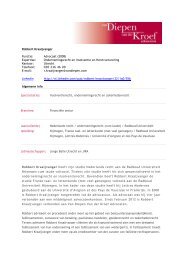© Van Diepen Van der Kroef Advocaten
© Van Diepen Van der Kroef Advocaten
© Van Diepen Van der Kroef Advocaten
- No tags were found...
Create successful ePaper yourself
Turn your PDF publications into a flip-book with our unique Google optimized e-Paper software.
United Nations has offered un<strong>der</strong> Section 29 of the Convention no possibility of access to thecourt.189. In the closing sentence of legal consi<strong>der</strong>ation 5.23 the District Court consi<strong>der</strong>s that theUnited Nations could not be brought before the national court solely on the ground of theaccess to the court safeguarded by Article 6 ECHR. That conclusion certainly cannot bedrawn on the ground of the judgments of the European Court of Human Rights in Behramiand Saramati and taking Section 29 of the Convention into account.Caselaw of the ECHR: immunity of international organisations190. For a proper un<strong>der</strong>standing of the European Court of Human Rights dated 18 February 1999in the Waite and Kennedy/Germany Case (no. 26083/94), which is also cited in the writ ofsummons (see point 456 et seq. of the writ of summons), the Association et al. brieflyrecalls the case. The judgment cited involved two employees of the European Space Agency,ESA, who were dismissed and brought a labour law dispute before the German court, whichheld that it did not have jurisdiction due to the immunity of ESA. The employees appealedagainst that judgment to the European Court of Human Rights, with reference to Article 6ECHR. The principal grounds for the judgment of the European Court of Human Rights are(see legal consi<strong>der</strong>ations 67 and 68):‘It should be recalled that the Convention is intended to guarantee not theoretical orillusory rights, but rights that are practical and effective. This is particularly true for theright of access to the courts in view of the prominent place held in a democratic society bythe right to a fair trial.(…)‘For the Court, a material factor in determining whether granting ESA immunity fromGerman jurisdiction is permissible un<strong>der</strong> the Convention is whether the applicants hadavailable to them reasonable alternative means to protect effectively their rights un<strong>der</strong>the Convention.’191. Subsequently the European Court of Human Rights held un<strong>der</strong> legal consi<strong>der</strong>ation 69 thatthe immunity invoked by ESA prevailed only because an alternative effective legal remedyexisted. That implies that in the present case immunity could not be accorded as noalternative effective legal remedy against the UN is available to the Association et al. The<strong>©</strong> <strong>Van</strong> <strong>Diepen</strong> <strong>Van</strong> <strong>der</strong> <strong>Kroef</strong> <strong>Advocaten</strong> page 81 of 99
















